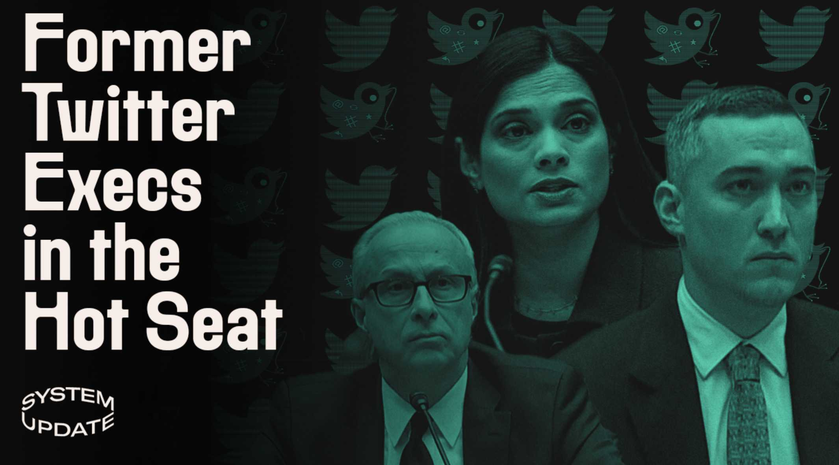Note From Glenn Greenwald: The following is the full show transcript, for subscribers only, of a recent episode of our System Update program, broadcast live on Rumble on Wednesday, February 8, 2023. Watch the full episode of System Update Episode #37 Here on Rumble.
In this episode, we report on the hearings that took place all day today in the House Committee on Oversight and Reform, as three former senior Twitter executives and one low-level pro-censorship “whistleblower” answered questions for more than 8 hours on how that company decided what to censor, whether parts of the government attempted to influence those decisions and whether they succeeded, and why Twitter specifically decided to brute-censor reporting from the New York Post on Joe Biden's business activities in Ukraine and China – and then proceeded to lock the nation's oldest newspaper out of its Twitter account for more than two weeks right as the 2020 presidential election was approaching.
We've covered that censorship decision multiple times on this show because, in our view, that specific act constitutes one of the gravest attempts yet to weaponize censorship to interfere in our presidential elections in decades, if not ever. We'll show you some of the key exchanges from today's hearing, what we learned and what it all means moving forward.
Also: the nation's most popular podcast host, the comedian Joe Rogan, is the target of widespread denunciations this week from many on the right and the left due to a joke he told on this program that his critics believe expressed vicious antisemitism, notably very notably, the anti-Rogan denunciations are being led by many people who have built their careers on opposing cancel culture and woke mobs and who, they say, –and we agree – often have hair-trigger sensitivities to lurking bigotry. We'll examine this illuminating controversy and ask whether consistent standards are being applied in general and to Rogan specifically.
For now, welcome to a new episode of System Update starting right now.
Monologue:
The House Committee on Oversight and Reform spent the day today grilling four former Twitter employees about the company's censorship policies and especially how those policies were applied in the weeks leading up to the 2020 presidential election. For more than 8 hours today, both Republican and Democratic members of that committee posed questions to former chief legal counsel of Twitter Vijaya Godi; former Twitter deputy counsel James Baker, who before that notably worked as the FBI's chief lawyer; Twitter's former head of Trust and Safety, Yoel Roth, a cultural leftist caricature very familiar to viewers of this program, primarily for his starring role in the Twitter Files reporting, and former Twitter employee Anika Collier Navaroli, whom Democrats were quite amusingly trying to herald as some sort of courageous whistleblower for criticisms of Twitter that perfectly aligned with the standard left-liberal desire for greater Big Tech censorship. In other words, she was there, this brave whistleblower, to keep telling committee Democrats that the problem with Twitter is not that it censors too much, but that it doesn't censor conservatives aggressively or frequently enough.
The context for this hearing, which we're so happy has finally arrived, is vital to understand. Like I said a couple of minutes ago, I regard the decision – and it wasn't only by Twitter, but also by Facebook – to manipulate the ability of Americans to access critical reporting – not about Hunter Biden, but about Joe Biden right before the 2020 election – as probably the single gravest example of weaponizing censorship in order to manipulate the outcome of democratic elections, in at least the last several decades, if not ever.
And there are all sorts of reasons why this ended up being such a serious matter. In part, because it's illustrative of broader trends to attempt to changet the Internet, the promise of which early on was that it would liberate all of us from centralized state and corporate control and would enable us to communicate freely with one another without the need to have this arbiter or this mediator being centralized in corporate and state power in between us. Instead, it has become probably the most potent weapon yet for propagandizing a population, because instead of allowing this free and open inquiry that the Internet was supposed to empower, it's now being used to censor any kind of views that are designed to challenge the establishment of orthodoxies. This one-way battering ram of messaging perfectly aligns virtually always with the U.S. government, generally, the U.S. Security State specifically.






















